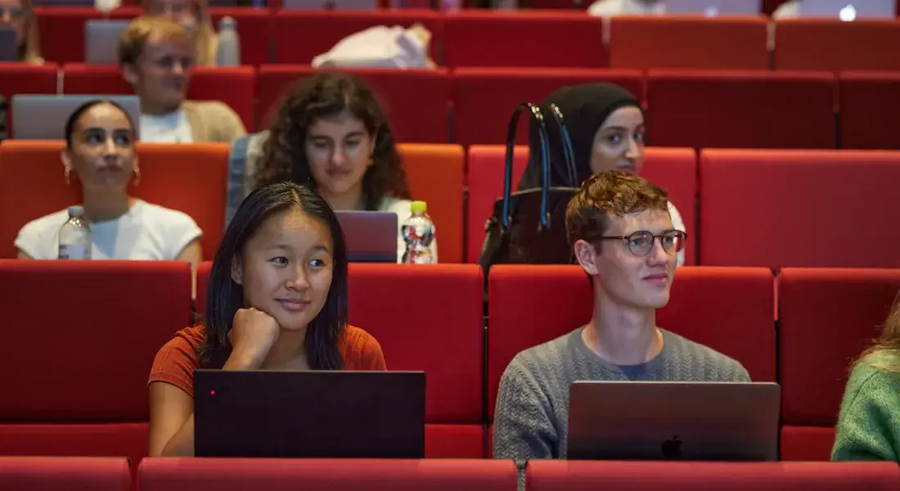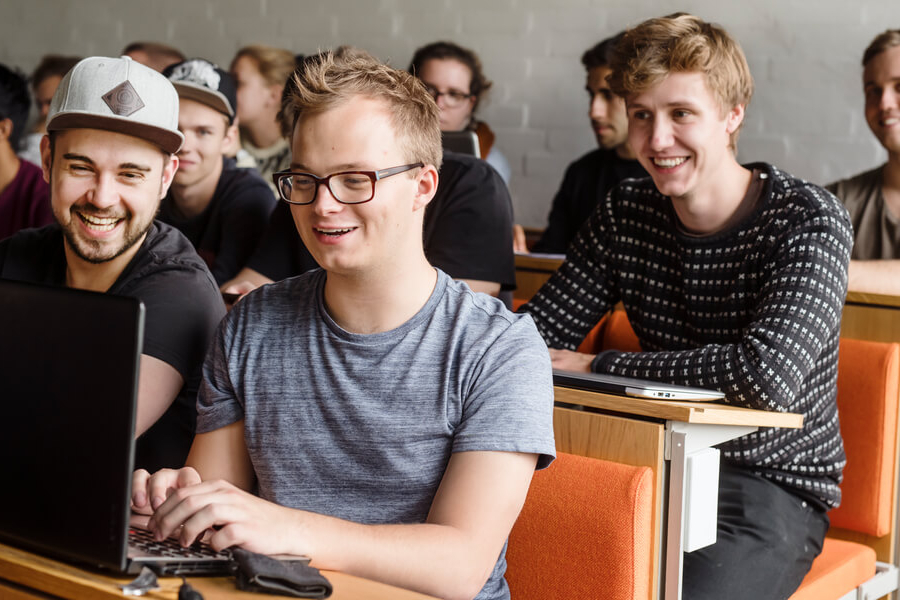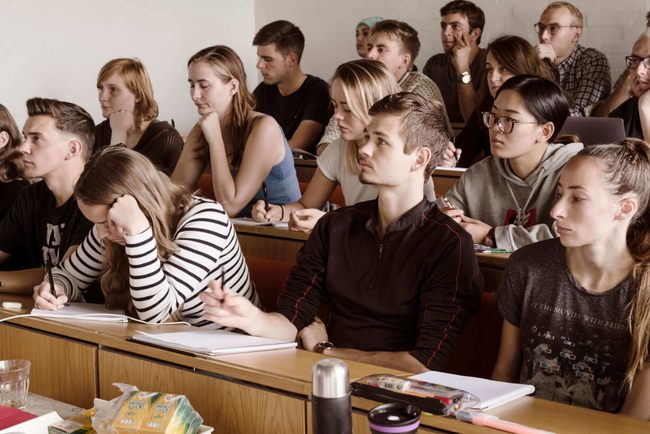Do you need special educational support?
Students at the University of Copenhagen (UCPH) with documented disabilities who need support in order to complete their studies can apply for special educational support (SPS).
Please contact us as soon as possible regardless of whether you want to apply for a master's degree programme, as a guest student or as an exchange student.
Below, you can find out if you are eligible for SPS and see what kind of support is available.

Who can apply for SPS?
- Danish citizens enrolled on a full degree programme
- EU citizens enrolled on a full degree programme
To receive SPS as a non-EU citizen, you must apply for equal status with Danish citizens according to either Danish rules and regulations or EU law (please contact the SU division at the Danish Agency for Higher Education and Science if you have any questions).
If you are a non-EU citizen interested in applying for a full degree programme at UCPH, you should contact the faculty that offers the relevant programme. They can inform you about your options.
Contact the faculty
Exchange students and guest students
As an exchange or a guest student at UCPH, you are not covered by the same terms as full-degree students. However, you can still apply for special conditions in class and at exams.
See information about SPS for exchange and guest students (studying at UCPH for one or two semesters).
The following information on this page is only for students who are enrolled on a full degree programme at UCPH.
Meet students who receive support
Contact us
If you have questions about special educational support during your studies, please contact UCPH Student Guidance who are happy to assist you.
Contact UCPH Student Guidance
Find opening hours and contact information for UCPH Student Guidance
Are you already a student at UCPH?
If you are already a student at UCPH and want to know more about special educational support, you can find more information at UCPH intranet (KUnet).
What support options are available?
The target group for special educational support is broad and the available support depends on your disability.
To apply for SPS, you must meet the following requirements:
- Your impairment must be diagnosed.
- You must have documentation of your disability (for example from your doctor or psychiatrist).
- You must be enrolled on a degree programme and meet the study activity.
- You must be a Danish citizen, covered by an international agreement or have obtained equal status with Danish citizens.
I have hearing or visual impairments
Why can it be difficult to study?
In addition to the more obvious difficulties in relation to seeing and hearing, it may be difficult to study because of:
- Problems with concentration and stamina
- Missing overview of studies
- Challenges in structuring and planning your course of study.
What help can I get if I'm blind or visually impaired?
- Assessment of your need for support at the Danish Institute for the Blind and Partially Sighted (IBOS)
- Aids, such as the IT starter pack for the blind or visually impaired, blackboard camera and cold lights
- Digital teaching materials
- Secretarial assistance
- Mobility hours by an IBOS consultant
- Study support hours by a support teacher to, for example, reading graphs
- Program that can read texts aloud or make PDFs easier to read
What help can I get if I'm deaf or hearing impaired?
- Sign-language or writing interpreter
- Hearing assessment
- Aids/support materials
- Secretarial assistance
- IT starter pack for the deaf or hearing impaired
- Study support hours with a support teacher
- Program that can make PDFs easier to read
How should I document my visual or hearing impairment?
- Hearing impairment: Copies of hearing graph and medical records from hearing clinic or hospital.
- Visual impairment: Documentation from an eye specialist/ophthalmologist stating your diagnosis.
I have a physical impairment
The most common form of physical impairment is a movement disability or chronic pain. This may be paralysis, hypermobility, pain in joints/muscles or arthritis. It could also be other serious or chronic diseases.
Why can it be difficult to study?
- Problems with concentration and stamina
- Lack of overview of studies and difficulty in structuring and planning
- Problems with specific assignments
- Pain in the musculoskeletal system and rapid fatigue.
What help can I get?
- Dictaphone for recording sound
- Ergonomic chairs, tables, mouse and/or keyboards
- Reading racks
- Computer with reading-aloud programs, etc.
- Secretarial assistance and/or practical assistance
- Program that can read texts aloud or make PDFs easier to read
Please note that transport to and from your studies is not a part of SPS.
How should I document my physical impairment?
- You must have medical documentation for your physical impairment.
- This could be from your own doctor/GP, a medical specialist, the hospital or e-journals.
- The documentation must show your full name, CPR number and date.
- In the case of chronic or serious illness, the documentation must describe your learning issues or other issues.
- This may, for example, be moving or visual difficulties that have an impact on your participation in your education.
- For progressive disorders, it is important that the documentation is relatively new and covers your current condition.
I'm dyslexic
Why can it be difficult to study?
- Slower reading speed than your fellow students
- Problems learning new course content through reading
- Problems in keeping sentences in your head while writing them down
- Problems in formulating difficult content in writing
- Major differences in written and oral formulation
- Problems in reading and writing in a foreign language
- Uncertainty of spelling
What help can I get?
- Dyslexia test
- IT pack with dyslexia programs for your own computer
- Instructions on how to use the IT pack
- Dictaphone to record sound
- Handheld scanner + C pen
- Digital teaching materials
- Support hours with dyslexia consultant
- Program that can read texts aloud or make PDFs easier to read
What are support hours?
If you are dyslexic, you can receive study support hours at KVUC’s writing center. The study support is planned according to your needs.
You will have a permanent counsellor at KVUC. Together, you can focus on strategies and methods related to reading and writing. You can also receive support in structuring your study work. For example, by planning oral and written exams together.
In the video below, you can hear KVUC explain their support hours. The video is both for you who suspect you are dyslexic, and for those who already know you are (note that the video is in Danish).
I have a mental impairment, ADHD or autism
Mental impairments can be, for example, anxiety, depressions, OCD, PTSD, schizophrenia or bipolar disorder.
If you have ASF (Autism Spectrum Disorder) or ADHD, you can get the same support as students with mental impairments.
Why can it be difficult to study?
- Lack of drive and energy for studying
- Concentration and memory problems during your studies
- Problems with stamina and keeping to the programme
- Problems with structuring your study everyday life, for example in connection with major assignments
- Lack of overview of the programme, syllabus, major assignments and exams
- Difficulties to get started, for example in connection with writing processes
- Feeling of confusion and discomfort in relation to study pressures
- Finding it difficult to be in social contexts, for example challenges of attending the programme and classes with many people
- Difficult to 'be on', for example, for presentations and group work.
- Challenges in contacting lecturers and fellow students
- Uncertainty about own study capabilities and academic skills
Hvilken hjælp kan jeg få?
- Study support hours at the Student Counselling Service (link in Danish)
- Student mentor (link in Danish): A UCPH student employed by the Student Counselling Service
- Academic support teacher (link in Danish): A teacher employed by the Student Counselling Service
- Dictaphone to record sound
- Program that can read texts aloud or make PDFs easier to read.
How should I document my mental impairment?
- You must have medical documentation for your mental impairment or neuro-divergence.
- This could be from your own doctor/GP, a medical specialist, the hospital or e-journals.
- The documentation must show your full name, CPR number and date.
- The statement from a psychologist is not enough; it must be supplemented by medical documentation
- Documentation of anxiety or depression must not be more than 1 year old.
What are study support hours?
I have a neurological functional impairment
A neurological functional impairment could be:
- Brain damage, brain haemorrhage, brain tumour or a stroke
- Long-term effects of concussion
- Epilepsy
- Chronic migraine and chronic headaches
- Inflammation of the nerves, paralysis or sensory disturbances
- Sclerosis
- Cerebral palsy
- Pains, such as facial pain or walking and mobility disorders
Why can it be difficult to study?
- Extreme sensitivity to light or sounds
- Concentration or memory problems
- Difficulty planning, creating structure and overview
- Joint vision problems or difficulty speaking
- Dizziness, walking disorders uncoordinated movements
- Severe migraine attacks
- Constant feeling of fatigue along with headaches and muscle pain
- Difficult to sit still or hypersomnia
- Reduced voice power and facial expressions
What help can I get?
- Clarification and study support hours at the Student Counselling Service (link in Danish)
- Student mentor (link in Danish): A UCPH student employed by the Student Counselling Service
- Academic support teacher (link in Danish): A teacher employed by the Student Counselling Service
- Dictaphone to record sound
- Assessment at the Institute for the Blind and Partially Sighted (IBOS).
- Program that can read texts aloud or make PDFs easier to read
How should I document my neurological impairment?
- You must have medical documentation for your functional impairment.
- This could be from a doctor, a medical specialist, the hospital or e-journals.
- The documentation must show your full name, CPR number and date.
- In the case of chronic or serious illness, the documentation must describe your learning issues or other issues.
- This may, for example, be moving or visual difficulties that have an impact on your participation in your education.
- For progressive disorders, it is important that the documentation is relatively new and covers your current condition.
What are study support hours?
How to apply for SPS
SPS is short for special educational support and can be anything from aids to personal support, however, not financial support or study help with subjects you are struggling with.
To be granted SPS, you must have a diagnosed functional impairment. You can apply for SPS throughout the duration of your studies.
See the video with Tanja who is SPS counsellor at UCPH. In the video, she explains how you apply for SPS.
How do I get my aids and support?
In the timeline below, you can see what happens from when you book a meeting to you receive SPS.
- 1
SPS meeting at UCPH
You can book a meeting as soon you are offered admission to UCPH. Then a SPS counsellor will help you get started with your support.
- 2
Apply for support
Your SPS counsellor at UCPH applies for the support and/or aids that you have discussed during the meeting. You will often receive some forms that you have to fill out and send back to your SPS counsellor.
The SPS counsellor at UCPH sends the application to the suppliers. - 3
The suppliers will contact you
If needed the suppliers will contact you within 10 days to make sure that you get the right support.
- 4
If you have been given an assessment
The suppliers prepare a report with descriptions of the recommended aids and support. The report can be used as documentation for dispensation applications and application for additional support.
- 5
UCPH applies for the recommended support for you
The SPS counsellor at UCPH applies for the recommended support.
- 6
Notification in your e-Boks
When your application has been processed, you will receive a message in your e-Boks. It often takes 3-6 weeks from you start the process until you are notified.
Please note that it may take a few months before your support is fully up and running.
- 7
Your aids are ready
You will be notified by your SPS counsellor when you can pick up your aids at UCPH's reception at Krystalgade 25, 1172 Copenhagen K.
![[Translate to English:] Studerende til holdundervisning](/fileadmin/_processed_/4/e/csm_Studerende_paa_SUND_2023_c83526cc3e.png)
What will we do?
At UCPH, we do not have our own team of psychologists, support teachers, mentors etc. In fact, the only support that we have on campus is the local student counselling services, who can help you to apply for special conditions on your education (e.g. extra time for exams).
Our process
The SPS counsellors apply for a grant for you from the state of Denmark (the Agency of Education and Quality).
If they approve your grant, UCPH will ask external suppliers like the Student Counselling Service.
Read more about the Student Counselling Service
Waiting time
You must be prepared to wait for up to two to three months upon your arrival in Denmark before the support is fully established. This is because we can only apply for a grant for you once you have a Danish CPR number. You must arrive in Denmark and find a place to live before you can file an application for a CPR number.
File an application for a CPR number
So, as an international student with disabilities, you must be prepared for some waiting before the support is established due to waiting time with case processing at the Agency and at the suppliers.

Housing for students with disabilities
Housing Foundation Copenhagen offers special attention to people with disabilities. Students with special needs applying for housing through Housing Foundation Copenhagen will be asked to provide information in regard to their disability in the online booking system and to provide documentation. For further information please contact Housing Foundation Copenhagen at: contact@housingfoundation.ku.dk.
Advice and assistance for students with disabilities outside the university
At the University of Copenhagen we will do all we can to help and assist you, but there are some situations for which we cannot provide solutions at this time. If you need a helper/assistant, the University can help connect you with a relevant entity. However, the University cannot cover the costs of the support. As a rule, prepayment is required.
If you want this helper/assistant or someone else to have the opportunity to talk to us about your application – or if they need to pick up your aids – you must give the SPS counsellors permission to exchange information with them by filling out a power of attorney and send it to the SPS counsellors.

Special educational support for exchange and guest students
As an exchange or guest student at UCPH, you can apply for special conditions in class and/or exams, apply for permission to use aids from home, or you can receive guidance regarding purchasing relevant aids through private companies in Denmark.
Usually, students can apply for financial support through their home university. Please contact your home university coordinator about financial funding.
How to apply for special conditions in class or permission to use aids
- Contact International Education at UCPH at incomingmobility@adm.ku.dk as soon as possible (preferably before you apply and before you have been accepted).
- Make sure that you can document your impairment or illness.
- International Education will help you get in touch with the right people at the relevant faculty/faculties so that you can receive the support you need.
How to receive guidance regarding purchasing relevant aids through private companies in Denmark
Please contact the Special Educational Support Office at sps@ku.dk and let them know what type of aid you will need to purchase.
Want to know more?
You will be able to get more information about deadlines and documentation after you have been accepted to UCPH.
Read more about student support, student counselling and well-being
